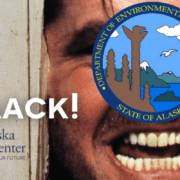Murky Waters Ahead, Troubled Waters Behind: What’s Happening with the Eklutna River?
I can’t say how many times I’ve seen a headline recently asking what is going on with the Eklutna River (Well, actually I can. Twice. Check out Emily Goodykoontz’ and Alex DeMarban’s article or Nat Herz’ podcast. I highly recommend checking out these pieces for a lay of the land understanding of what’s occurred.)
But, my question, and one many people are asking now is: what just happened? And what’s next?
On April 15, the Matanuska Electric Association Board of Directors approved a resolution to send the Final Fish and Wildlife Program to the Governor.
On April 24, the Chugach Electric Association Board of Directors did the same.
The Final Fish and Wildlife Program does not right a historical wrong, and does not give salmon a chance to return to the lake. Instead, it relies on the previously proposed AWWU portal (now called the Eklutna River Release Facility) to restore just 11 miles of the river. The best that it does is offer extremely limited “reopeners” – opportunities for the Project Owners to revisit the project 10 years after the implementation of the proposed Final Program – this would, at the latest, take place in 2042. These reopeners are only helpful if a new technology comes along to allow for cheap fish passage (the project owners have maintained that they won’t pay for it), or inflows to the lake increase dramatically.
We’re entering the final phases of approval of the plan. Although the plan was sent to the Governor, the ball is now in a couple of resource agency’s court: US Fish and Wildlife Service and National Marine Fisheries Service now have 60 days to submit comments on the final program. After that, the owners of the project will have 30 days to submit responses to these comments.
As it stands, all of this information will be sent to Curtis Thayer, Executive Director of the Alaska Energy Authority. Curtis will then compile a report and submit it to the governor. The governor has to make his decision by October 2nd.
The Alaska Center will continue to call on our utility cooperative to exercise their power to right a historic wrong and restore a free-flowing river from the ocean to the lake that can support salmon – the heartbeat of Alaska.
Four out of five Alaskans who submitted comments on the draft program supported river restoration and/or fish passage. We thank you for lifting your voices throughout these last months. Stay tuned and stay with us!
Stream regards,
The Alaska Center




